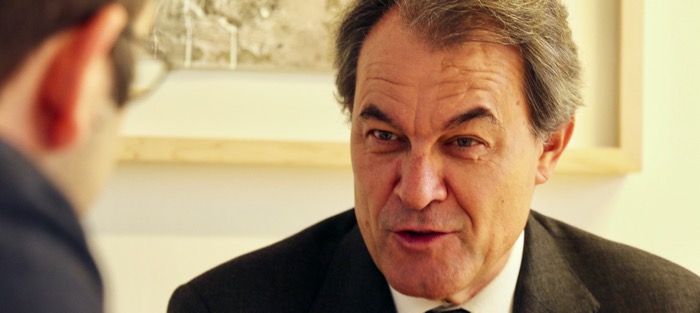16.05.2017 - 19:16
Artur Mas (Barcelona, 1956) gave up the presidency of the Catalan government in January 2016 to Carles Puigdemont. Out of the political frontline, Mas has continued to make the news by being banned from public office for the symbolic consultation on independence of 9 November 2014. We talk to him about the final straight on the road to the independence referendum and the future Catalan state.
— Do you think that the sentence imposed on you by the Higher Court of Justice of Catalonia was not harsher for some reason?
— I think it was harsh enough, we mustn’t ignore the background. They judged us as criminals and have separated us from the frontline of political representation simply because we set up a participative process without a legal bond. The fact in itself is tremendous. Very serious. Then the more accidental or complementary part is whether the sentence is for two or three years and the fine is more or less thousands of euros. These are the collateral effects, but not the main question.
— It is serious that a legal process has been carried out for bringing out the ballot boxes.
— That there has been a criminal court process and we have had to spend a few days sitting before the judge. The judge in a criminal court! As if we were delinquents for having organised the events of 9 November 2014. I think it is tremendously serious from the point of view of the democratic health of a state and of the pillars of the state of law.
— You say you want to make Catalonia the Denmark of the Mediterranean. But there are no Danes here.
— Here there are Catalans, and that means five or six things. It means making a country with little unemployment, making a country with decent salaries, with a more open economy and therefore one that is more innovative. With a very solid and sustainable welfare state (health, education, social services). A country based on education and culture, and of high quality democracy. That is Denmark, with all of its shortcomings.
— Will the referendum be able to be held decently, bearing in mind the Spanish state’s decision to prevent it?
— That is the battle, the true battle is that. Not whether the referendum will be held or not. The referendum will be held. In the sense that the referendum will be held right down to the final consequences. All of that is already underway. The question is whether the guarantees will be given at the time of voting for it to be considered a true referendum. We have a great adversary; well, more than an adversary, the Spanish government is an enemy. The game has come that far.
— Is there any alternative to the referendum and to the application of the result?
—No. If there is any alternative, let someone tell us. I can’t see anyone putting any alternative on the table. Saying that it has to be agreed? That is a twist that might become the condition impossible to fulfil. For there to be an agreement, both parties have to be willing, and if there is one party that doesn’t want to consider it under any circumstances and which wants to destroy it all? How do you reach an agreement? We have offered to talk with the state over the question, the date, the conditions and the consequences. But the state says no way.
— What would the Spanish government have to say for the referendum to be put off?
— Not for it to be put off, to give a date to hold it. That is not an adjournment.
— If it has been announced that it will be held in September at the latest, it will be a question of adjourning it.
— But what is better, a referendum held under conditions of total aggression as we will find in September, or doing like the Scots and British when they agreed and ensured that it would have binding consequences? Is there no-one with a little common sense who would not change a referendum that has to be held unilaterally with head-on opposition from the Spanish state, for an agreed referendum with binding consequences? There isn’t is there? Even the most independentist people in the world, if they want independence, would surely prefer to have a referendum in the best conditions. But we are talking about something absurd, because there is no-one with a little common sense who thinks that the Spanish state will make an offer to agree on a referendum over the independence of Catalonia. Obviously not.
— Bearing this in mind, September can’t go past without a referendum.
— That’s right, because it is the culmination of the last five years. We are at the decisive point in the five years’ work since September 2012. I brought the elections forward to September 2012 to find out what majority we had in favour of the referendum, and we got more than two thirds support. Now we have to take the final vote.
— Now you are a kind of ambassador of the process. What do they say to you when you explain the referendum to the world?
— I find I receive three or four different reactions. Generally, there is natural acceptance that Catalonia is a nation and that it has a right to decide on its future. Total unanimity in not understanding the unmoving stance of the Spanish state, and even less so the judicialisation of the Catalan case, no one understands that. From the point of view of the referendum, many people see that it is the best way to resolve the conflict. The Spanish state has not lost the referendum even before it is held. And finally, where there are most reserves is over the independence of Catalonia.
— Why?
— Because it creates two problems for them. One very large problem, which is the relationship with the Spanish state. The Spanish state is very tough over this question and it might create an internal problem in some states for supposed similarities. Many would like to see an agreement between Madrid and Catalonia so everything would remain in an order that would affect no other countries. But almost all act neutrally, which is very favourable for Catalonia and the sovereigntist theses. With the pressure of the Spanish state to bring them down off the wall, the fact that they remain neutral means that they are expectant, waiting to see what happens. And this gives us cards in the poker game.
— This hypothetical agreement to leave it all within a certain order … have you discarded it?
— I don’t discard this ending up in a negotiation, but in any case it will be after the referendum, and not before.
— If the referendum ends up in independence, the negotiation will not be able to imply non-independence, will it?
— Obviously if the result of the referendum is in favour of independence, the negotiation will be over how the result is to be applied. But to be able to apply the result of the referendum, there has to be agreement with Madrid and Brussels, because a lot of things have to be shared out. The future state of Catalonia must know what part of the Spanish state’s public debt it is responsible for. It has to know what is left in the pensions reserve fund. It has to know what is to be done about the Catalan government’s debt with the Spanish state. It has to know how the buildings, infrastructures and a lot of properties that the Spanish state has in Catalonia are to be shared out. It has to know the position of Catalonia within the European Union and the contribution it will have to make to the European budget. A lot of things have to be talked about.
—Xavier Sala i Martín a short time ago said in an interview that if the referendum couldn’t be held because the state managed to prevent it, independence would have to be declared on the day following. Do you agree?
— I cannot foresee the referendum not being held.
— And what if there is physical violence from the Spanish state?
— Then we enter a situation of maximum tension with the Spanish state, but not over independence. The maximum tension would be for the denial of a fundamental right, the right to vote, and the situation would be different. I do not know what the consequences of this situation will be.
— And what will have to be done? How will we have to react?
— The decision that could be taken in a situation like this calls out to Catalan citizenship as a whole. If the state physically prevents the referendum, there will have to be a strong and permanent reaction in the street.
— And some institutional reaction, I imagine…
—That too. But above all there has to be a reaction in the street, and not just for one day. When I talk about the state of great tension between Catalonia and the institutions of the Spanish state, I refer to a situation of peaceful, eh?, tension in the street, and permanently. We will not talk about whether independence or not. We will talk about the fact that the Spanish state has boycotted the vote. There will have to be a sufficiently strong reaction for the international community to clearly see that the population is being oppressed and that it has been denied a fundamental right.
— A permanent mobilisation to make the international community act?
— Obviously. To stop the Catalan question being simply an affair of Spanish internal policy, as they are saying now. It will no longer be a Spanish domestic affair.
— If the referendum is held and is won, what will the consolidation of the Catalan state depend on?
— On two things. That at some point in the time that follows Catalonia can work as a state, and this depends on whether it is internationally recognised. These are two things that go together. The Catalan state will have to be able to function as a state, and that means: it has to collect taxes; it has to be able to make laws in the parliament that are then obeyed; it has to begin to have its own judicial apparatus to impose the laws and to resolve all conflicts that might occur; it has to be able to develop systems of intelligence and defence … It has to be able to work as a state.
— And how long will be needed for all of that? Have you thought of the day when it will be possible to talk about full independence?
— Nobody knows. It is not the same thing to do it with some kind of agreement with the state, as to do it with the absolute disagreement of the state. It is very likely that, when the referendum has been held and if the yes vote comes out, the Spanish state will deny it all. That is very likely. It is for this reason that I say it will have to be accompanied by tension, peaceful and serene tension, but tension all the same, permanently in the street. Independence will have to be won by the Catalan citizens. This is something that came from the roots of the people and the people will have to win it. No sacrifices or heroics will be needed, but rather determination and collective character to end up achieving what is wanted.
— What was Jordi Pujol’s most important mistake?
— Having given no importance to something he had. The lack of correspondence between the discourse he made and the reality that he practised in some way.



